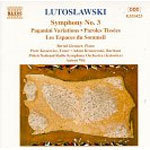
Lutoslawski - Orchestral Works Vol 3: Symphony No. 3 / Paganini Variations
 $25.00
Low Stock
add to cart
$25.00
Low Stock
add to cart
WITOLD LUTOSLAWSKI
Lutoslawski - Orchestral Works Vol 3: Symphony No. 3 / Paganini Variations
Polish National Radio Symphony Orchestra; Antoni Wit, conductor, with Bernd Glemser, piano
[ Naxos / CD ]
Release Date: Thursday 4 September 2003
Should this item be out of stock at the time of your order, we would expect to be able to supply it to you within 2 - 5 business days.
"a series that is setting high standards in budget-price contemporary music....Wit conjures a fantastic range of tone colour from his well-drilled Polish orchestra ...the third symphony has never sounded more convincing"
- Classic CD
Witold Lutoslawski was born in Warsaw, Poland, in 1913, and was fortunate enough to study both the piano and composition privately. He was almost twenty before he entered the Warsaw Conservatory to conclude his education. He was taught composition there by Witold Maliszewski, who in turn had been a pupil of Rimsky-Korsakov.
Lutoslawski was to gain employment not as a composer, but as a concert pianist, and subsequently as a conductor. He did, however, lecture on composition in England, the United States, Sweden and Germany. In his later life, when his music became better known, he was given almost every major European musical award.
As a composer he had his first taste of success when he was 25 with the Symphonic Variations. His output was to undergo three major changes of direction, though it was always in a state of flux as he experimented with new sonorities. He was also his most severe critic, which curtailed his output, and on his death in 1993, he left a very modest catalogue of works, mainly orchestral and vocal.
The lack of income from composition demanded that he continue as a performing musician, and in that role he conducted most of the major European and North American orchestras. His personality was that of a very mild mannered man, whose interest in the younger generation extended to his offering to fund the London study of the soloist on this disc, Andrzej Bauer.
The Overture for Strings dates from 1949, and belongs to that large number of works commissioned by Paul Sacher and the Basle Chamber Orchestra. It was almost a preparatory work for the large-scale works which were shortly to follow, such as the Concerto for Orchestra. It lasts little more than five minutes, but in that short period, the composer packs into the score so many absorbing tonal structures, that even those with a scant affection for 20th century music, will find much to enjoy. Five years later Lutoslawski proposed to the Warsaw National Philharmonic a concerto for the whole orchestra to be conducted by the great Polish musician, Witold Rowicki. It consists of three movements, the third more extensive than the sum of the first two. The work calls for considerable virtuosity as the colours of the orchestra are fully explored, making it a work of immediate attraction. The big driving rhythms of the opening movement set the scene for a dramatic score, culminating in The 1963 score for the Three Poems by Henri Michaux marks the beginning of the composer's interest in French surrealist poetry. He uses three poems, scoring the work for choir and small orchestra, the choral writing of extreme complexity, and uses the voices in many unusual ways, with whispering, shouts and recitation. It is a score that presents a challenge to both performers and listeners.
Mi-Parti was completed in 1976, the word meaning two equal but unalike parts. It was to a commission from the Concertgebouw Orchestra, and proved to be a work of the most exotic and erotic orchestral sonorities. It is in one continuous movement lasting around fifteen minutes, and the two parts named in the score are themselves built from smaller sections. It is a score painted in warm colours, the coldness of the concluding bars coming as something of a surprise. The work has become one of the composer's best known orchestral scores.
The Polish National Radio Symphony Orchestra was founded in Warsaw in 1935, though the present orchestra was reconstructed after the war in Katowice, from where it now broadcasts and enjoys a healthy concert life. It has undertaken extensive European tours in recent years, and has recorded for a number of major labels. However, in the past decade it has become best known for its many award winning recordings on the Naxos label.
Antoni Wit was born in 1944 and studied conducting with Henryk Czyz, and composition with Krzysztof Penderecki at the Academy of Music in Cracow, later continuing his studies with Nadia Boulanger in Paris. In 1967 he accepted the post of assistant conductor of the Warsaw National Philharmonic Orchestra, and since 1983 he has been Music Director of the Polish National Radio Symphony Orchestra in Katowice, with whom he has toured extensively. He has conducted in the most important European and American concert halls, directing such orchestras as the Berlin Philharmonic, Dresden Philharmonic, BBC Symphony, London Philharmonic and Berlin Radio Symphony. His recordings have won many international awards, including the complete Prokofiev Piano Concertos on Naxos, which was awarded the 'Diapason d'Or' in France. Two of his recordings, the Prokofiev Piano Concertos and Smetana's Ma Vlast, are included among the Penguin Guide to Compact Discs '500 outstanding recordings'. The American Record Guide has described him as a conductor who has "taste, musicianship, leadership, technical expertise, and emotional rapport". Presently he is recording the complete orchestral works of Lutoslawski.
Tracks:
Paganini Variations
01. Paganini Variations 09:50
Bernd Glemser, piano
Paroles Tissees
02. Paroles Tissees 03:13
03. Paroles Tissees 03:13
04. Paroles Tissees 04:08
05. Paroles Tissees 05:16
Piotr Kusiewicz, tenor
Les Espaces du Sommeil
06. Les Espaces du Sommeil 15:27
Adam Kruszewski, baritone
Symphony No. 3
07. Symphony No. 3 31:34
